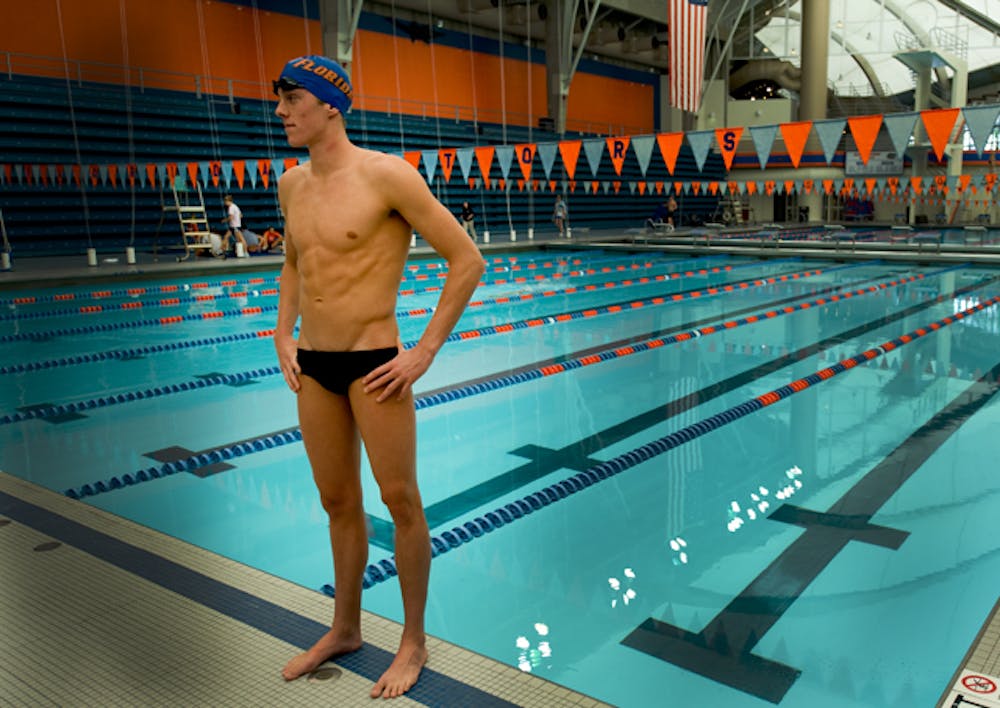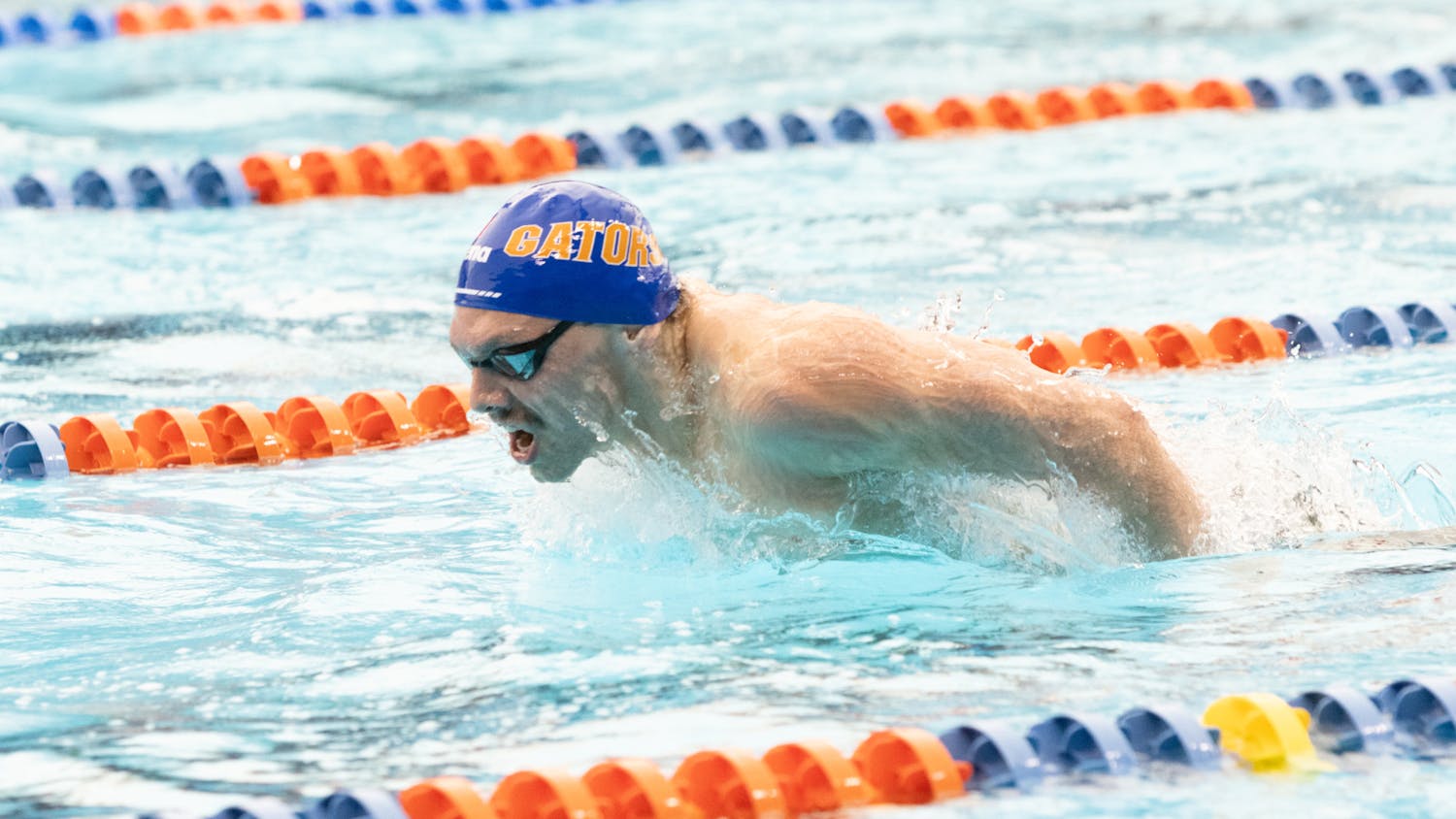Beads of sweat trickle down their faces as their pummeling fists crash against each other’s stiff palms. Jump ropes graze the ground — a clacking that permeates the O’Connell Center — forming a beat that could be counted with a metronome.
It’s boxing conditioning day for the Gators’ swimming and diving squad, a team-favorite workout that skims the surface of its nine weekly practices.
“I like boxing,” senior swimmer Conor Dwyer said. “If your core is in shape, it benefits you to be an all-around athlete.”
The team doesn’t dabble in the pool for a cluster of laps to become elite athletes — that’s kids’ play. The men’s and women’s squads clock in 13 hours of training during a typical week, Monday through Saturday, including weight training, dry-land workouts and time spent in the pool.
“We do what it takes to compete really well,” coach Gregg Troy said. “We do challenging stuff, but it’s race-relative.”
Forming record-breakers and U.S. National Team swimmers extends far beyond the expected scribbled exercises on a loose-leaf piece of paper — it takes a village.
Heavy Metal
Navigate over to justbig’s YouTube channel. It’s drenched with conditioning videos. One clip shows justbig flipping a 1500-pound tire down the road — that’s Matt DeLancey.
DeLancey is the assistant director of strength and conditioning for the Gators — the man behind the training for UF’s volleyball, swimming and diving, and field athletes.
During a typical week, DeLancey meets with the swimmers at least three times to punch-in pump time in the Griffin-Oakley Strength and Conditioning Complex that looms beneath The Swamp.
“The atmosphere is intense, there’s no messing around,” junior Shara Stafford said. “Everyone becomes so focused and determined. It is one of my favorite places to be.”
No messing around, indeed. It isn’t a typical gym environment of towel-whipping and teasing alongside rusted dumbbells. This weight room features 25,000 square feet of workout space including weight and cardio machines, wood platforms and a 50-yard long turf space lined with medicine balls — all tools that aid in the metamorphosis of an athlete to a champion.
And the discipline it takes to get there? That lies in the rules established to ensure the athletes are always on point.
Upon their entry, they don’t dare disrespect UF by stepping on the giant, roped-off Gator head that’s printed on the floor.
No wearing clothes that aren’t Gators-issued. No cell phones. No chit-chat. Be on time. And please, wipe down the pads.
“Mom and Dad don’t work here,” DeLancey said.
It’s serious business that the Gators’ swimming and diving team squeezes every last drop out of. The team’s training program requires top-notch effort all fall to prepare for the Southeastern Conference and NCAA meets in the spring.
“It makes for a very rigorous and intense training schedule that wears you down so much,” Stafford said. “But when we rest in the spring, we know we are going to be good because of all the work we put in throughout the fall.”
Since the team goes all-out in fall training, its dead tired for regular-season meets. But, a few weeks before SEC and NCAA time, they rest up to mark their qualifying times.
The strength workouts from DeLancey vary for each swimmer depending on the events that they compete in. The sprint swimmers meet more often than the others, and the whole squad is divided into four weight groups.
“Everyone’s got weaknesses that differ from the next one,” DeLancey said.
Ranging from medicine ball exercises to lifting to plyometrics on the stadium steps, the team’s conditioning all translates to balling out in the water.
According to DeLancey, vertical jumping directly relates to starts and turns in swimming. Among other exercises, the swimmers also focus on arm stamina and endurance, key traits in the lanes.
DeLancey’s seven-year client, former Gators swimming great Ryan Lochte, can be seen on the justbig channel swinging and twirling 60-pound boat ropes to work out his guns.
Though Lochte graduated from UF’s swimming program in 2006, the Olympic gold medalist still utilizes the O’Connell Center’s swimming facilities, practices with the team and trains with DeLancey.
However, Lochte trains with DeLancey strongman style, honing in on exercises such as heavy tire flipping and keg-throwing.
“It’s hard to be out of shape as a swimmer,” DeLancey said. “Swimming a mile is like running four miles. Our swimmers are definitely the most fit group on campus.”
Fueling Up
The Gators get going before the sun has even brimmed across the horizon. At 6 a.m., the team kicks off its first practice of the day, lasting until 8 a.m. Then comes the day of classes. The team returns at around 2 p.m. for the day’s second practice. At 5 p.m., they round out their athletic day and transition to tutoring sessions and studying. With jam-packed weekdays and competition-filled weekends, the fuel the Gators down isn’t taken lightly.
The Gators’ director of sports nutrition, Cheryl Zonkowski, explained that the athletes’ nutrition is addressed almost immediately in their initial freshman physical, covering all bases ranging from eating habits to weight and medical history to blood sugar sensitivities.
“We go over what their eating history was like in high school and at home and figure out what we can do so they can eat similarly so that they can perform well here,” she said.
This includes their introduction to the Gator Training Table, an area designated for student-athletes in Gator Corner Dining Center that contains a special menu designed by nutritionists.
Most of the swim team comes in to eat at the table after practice.
Staff members are available at meal times to answer nutrition-related questions, and Zonkowski said the swimmers are most unique in their nutritional inquiries.
“Swimmers are very, very detail-orientated,” she said. “They want to do all of the little things right.”
For athletes who compete in an event where one one-hundredth of a second matters, they thrive on detail.
But maintaining nutritional structure is challenging with more than half of the season’s meets on the road. The Gators’ nutrition squad has it covered, though.
The team has food — tailored to each swimmer’s dietary needs — delivered to the pool deck or hotel for away meets, ensuring that the athletes are fueled properly and efficiently.
“Their time on the road is very valuable,” Zonkowski said. “We want to make sure that they have the time they need to take online quizzes, study and stretch so they aren’t wasting time at restaurants.”
This weekend, the Gators travel to Atlanta for the three-day Georgia Tech Invitational. Both the men and women are ranked No. 4 in the College Swimming Coaches’ Association of America national poll.
The Gators are returning to competition for the first time in two weeks — meaning they got to attend the football game against South Carolina after practice finished up at around 11 a.m. on Saturday, following a quick nap.
“If you have any spare time during the day, we usually try to fit a nap in,” Stafford said.
After all, beast mode needs recharging.





